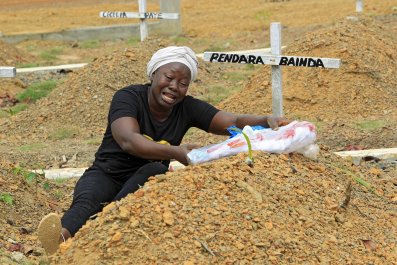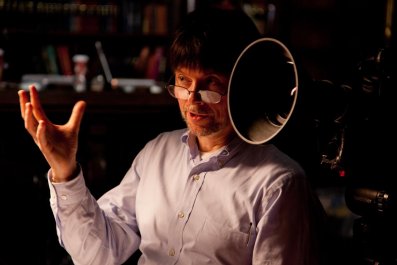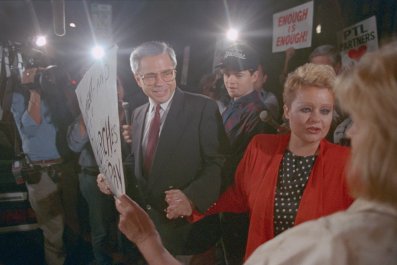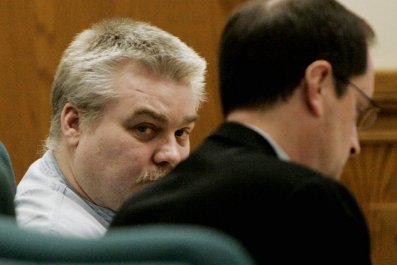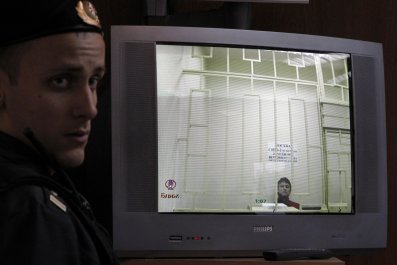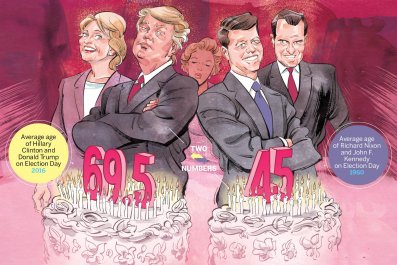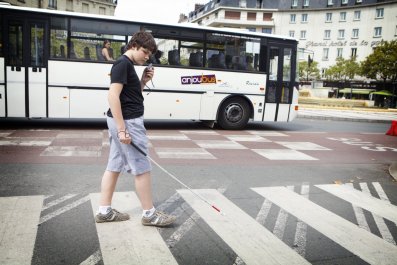It took a couple of weeks for Derek Oatis to return my call, and when he finally did, the first thing he said was, "Wild guess, is this about The Preppie Connection?"
Oatis, 49, lives with his wife, two dogs and three cats in Glastonbury, Connecticut, where he practices criminal and civil law. He's the same Derek Oatis who, at 17, smuggled $300,000 worth of pure cocaine from Venezuela into the U.S., igniting one of the greatest prep school scandals in American history.
He was a scholarship student at Choate Rosemary Hall, an elite private school in Wallingford, Connecticut, that counts John F. Kennedy and Edward Albee among its alumni. The story made national headlines, sparking an in-depth 60 Minutes piece, and saddled Oatis with five years of probation and 5,000 community service hours—and that was a lucky break, considering he faced up to 15 years in prison. More than 30 years later, his colossal teenage missteps have inspired a movie, The Preppie Connection, now in theaters and on demand.
"I thought the movie was already released six months ago [at the Hamptons Film Festival]. I thought, That's great—the movie got made and nobody knows about it!" Oatis says.
He doesn't spend much time reminiscing about the biggest mistake of his life, and when he does, it's with clients who can benefit from his story. A few years ago, a friend asked him to talk with his son, who was being investigated by police for breaking into homes with his girlfriend to support a heroin habit. Only Oatis was too late. Before that meeting could take place, his friend called to say he'd just found the couple hanging from a tree. "The ones that really hit home for me are the ones with really bad endings," Oatis says. "I have a lot of parents who come to me with a kid who got into trouble, usually drugs, and my experience makes it a lot easier for me to speak to them."
Oatis wishes he'd had someone to turn to in high school. When he thinks back to who he was at Choate, he recalls a lonely, depressed young man. He was doing well in some classes and terribly in others. His grades were faltering, and he didn't have many college prospects. "How do you go from this to smuggling a pound of cocaine in from JFK Airport? Maybe it was [that] I was never concerned about getting into the right school or right job. I didn't have as much to lose."
Longest Minute of His Life
The story of how Oatis wound up smuggling nearly a pound of cocaine out of Venezuela starts long before his first day at Choate. His mother, Sofie Oatis (now Buyniski), was born in a displaced person's camp in Kiel, Germany, at the end of World War II. Her parents and two sisters had already survived Nazi slave labor camps. She was 5 years old when she arrived in the U.S., malnourished, balding and nearly toothless. "When they came over, they truly had nothing," Oatis says. "My mom was very motivated in trying to get me the best education possible. She went to Southern Connecticut State University, and she'd drive by Choate and say, 'Geez, it'd be amazing to have my child go to the same school JFK went to.'"
Growing up in the blue-collar town of Meriden, Connecticut, Oatis excelled academically without trying very hard. He went to summer programs for the gifted and attended a local science school. Yet he was so ambivalent about applying to Choate that, when his acceptance letter arrived, he initially told his mother that he'd been rejected. "The thought of saying no was not a possibility to me," he says.
Arriving on the 458-acre campus freshman year, Oatis was awestruck by the stunning red-brick Georgian buildings, sprawling greens and majestic wooded areas. The students, most of whom were boarders from well-off families, made him feel like a foreigner: "They had a manner, style and experience that was alien to me." Choate was a place where parents arrived for annual parents day events in private helicopters. Once, Oatis accompanied a friend's family to a Chinese restaurant and realized that "these folks can identify the regions from China where all the food came from—and pronounce them." Oatis's mother was a public school teacher, and his stepfather, James Oatis, worked as a truck driver and vending machine delivery man. (Oatis's biological parents divorced before he was born, and his stepfather adopted him after marrying his mom.) They drove a beat-up Dodge Dart.
Sophomore year, Oatis started hanging out with Matthew Holmes. "He was in the same boat as I was. He was not a super popular guy," Oatis says. That changed when Holmes brought marijuana to school from Venezuela, where his parents lived. Then he began smuggling small amounts of cocaine. "He was doing things for many of the same reasons I did: to bolster self-esteem, get a little more attention and fit in." Then again, maybe he also liked getting high and having cash to spend?
In March 1984, Holmes invited Oatis to Venezuela for spring break. By that point, Holmes had already brought cocaine back to school five times, and on this trip he scored big: 200 grams. They hid the coke in a bottle of baby powder, and at the last minute, Oatis offered to carry it back into the U.S. "I felt I owed him. I hadn't paid for anything. And I did—I brought it back without any incident whatsoever."
About six weeks later, Oatis and his girlfriend, Catherine Cowan, returned to Caracas for another big score. Holmes made the arrangements. Oatis remembers sitting in a hotel room, tense, waiting, scared senseless. Around 10 p.m., they heard a loud knock on the door. Oatis opened it, and three men with guns walked in. The one in charge was short, with a thick, black mustache he kept twirling between his fingers. The other two flanked him.
"Are you Derek?" he asked.
Oatis said he was.
The man pulled out 350 grams of cocaine wrapped in heavy plastic. Oatis handed over $5,000 in cash. It was the longest minute of his life. "Part of me realized I'd be lucky to get out of there alive," he says.
As he had done before, Oatis hid the coke in a bottle of baby powder, covering it with a layer of baby powder. When he realized the bottle wasn't big enough, he tossed the remaining loose bags of cocaine into his jacket pocket. Then he headed back to the U.S. with Cowan.
They made it all the way to New York's John F. Kennedy International Airport before two law enforcement officials stopped them. "My heart came up into my throat. I knew that the whole charade was over," Oatis told 60 Minutes in 1984. At first, Oatis thought it was a random search, but he later learned that Choate administrators had alerted the government that two of its students might be smuggling drugs. (It took over a year for Choate to admit this publicly.)
The officers took Oatis and Cowan into a room, searched their belongings and found the bottle of baby powder in Oatis's suitcase. "They sniffed it and dumped it into the garbage—there was a little baby powder at the top, so it looked like baby powder," he says. When they searched Oatis, they found the packets of cocaine in his pocket. "Where's the rest of it?" they asked. "I was stupid enough to say, 'You just dumped it in the garbage.'"
Oatis received his five years of probation and 5,000 community service hours. Cowan was sentenced to three years of probation and 1,000 community service hours. Both were expelled from Choate, along with 12 other students who gave money for the drug buy.
Doing Lines on Homer
"As perverse as it sounds, it was an adventure," Oatis says. "I'm not making excuses for my poor judgment, but Choate was a very isolated world.... If I was going to my local high school, you get a bunch of friends in a car, drive around, someone goes in with a fake ID to buy a case of beer and park somewhere and drink, and you keep an eye out for police. In a way, what we were doing seemed less risky than that.... At Choate, there were no police. No consequences. It was our little universe."

The Preppie Connection, which takes its name from the 60 Minutes segment, brings this universe to life, albeit somewhat limply. Toby, a scholarship student at the fictional Sage Hall, starts dealing cocaine to classmates and ends up in Colombia buying drugs from a cartel. He does it all for power, belonging and, of course, a girl who's just out of his reach. The movie plays on stereotypical private school elitism: cool kids watching rugby while sprawled across manicured lawns or doing lines of coke on a copy of Homer's Odyssey. An unpopular boy teaches Toby how to blend in by telling him to study GQ. There's even a main character named Ellis William Thynes III, whose father rode horses with President Ronald Reagan. Despite a chase scene, midnight swimming and lots of partying and sex, the film is dull around the edges. A documentary would have been far more compelling.
Director and co-writer Joseph Castelo (The War Within) first contacted Oatis nearly a decade ago. Oatis had avoided talking publicly about his past, but he was impressed by Castelo's work and liked the fact that they both came from working-class families and had been scholarship kids at prep schools. After his first meeting with Castelo—on his 40th birthday—Oatis went into an emotional tailspin. "I had a hard time revisiting the stuff. It prompted a return to therapy. I had a huge amount of guilt for what I did to my family. But in a weird way, it helped me process this stuff in a way I never had."
Oatis has started fielding phone calls from the press. The other day, he spotted co-workers searching for local theaters showing the movie. "I want Joe [Castelo] to do really well, but I hope nobody sees it. It's hypocritical to be talking to you and saying that at the same time, but having a movie made about the worst experience in your existence..." Oatis trails off.
"It's been cathartic a bit and helpful for me to come to terms with this, but I pray my mom never sees it," he says. "I know she probably feels tremendous guilt and probably blames herself much more than me, which is wrong.... She wanted more than anything to give me the best education I could possibly receive.
"I don't know what words would get through the thick skull of a teenager, especially one using drugs or with emotional issues, but nothing matters but your existence, your health, your family," Oatis says. "I walked right up to the edge, and I'm lucky I didn't get killed or end up in prison."




